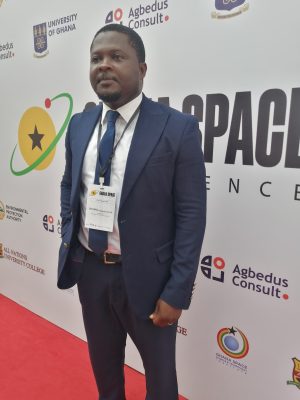By Buertey Francis BORYOR
Ghana’s maiden Space Conference has opened in Accra with a call for stronger financial and policy commitment to harness space science and technology for national development.
Joseph Bremang Tandoh, Director of the Ghana Space Science and Technology Institute (GSSTI), said it was time the country moved from being a user of space products to an active producer of space technologies that could create jobs and transform industries.
“Why do we need to pay another country to observe our own farmlands and tell us what is on them? We need to invest in building our own tools. Once there is funding and a functioning space agency, the coordination, capacity development, and market growth will follow,” he said.
Tandoh explained that while countries like Nigeria have committed millions of dollars to their space programmes, the country still lacks consistent financial backing. He called for the speedy establishment of a national space agency to coordinate research, training, and private sector innovation in satellite data, navigation, and remote sensing.

Additionally, he noted that space-based tools were already part of daily life through weather forecasts, navigation apps, and digital communication, and added that Ghana had “the brains and policies” to succeed if government funding and private partnerships improved.
In his welcome address, Kwaku Sumah, Managing Director of Spacehubs Africa, said the conference- themed “Harnessing Space Technology for Sustainable Development and Inclusive Growth”, was conceived to raise awareness of space technology’s value to ordinary life and to inspire national commitment.
He said space technology should not be seen as unnecessary when many citizens struggle with economic challenges. “Space inventions like GPS, water purification systems, solar panels, and weather forecasting have already changed how we live. Space is not just about astronauts and galaxies- it is about solving daily problems,” he also said.
Mr. Sumah further stressed that the nation already has strong foundations, citing achievements such as the All Nations University’s launch of GhanaSat-1 in 2017 and the conversion of a 32-meter satellite dish at Kuntunse into a radio telescope that now contributes to the Square Kilometer Array network.
He commended the efforts of Ghana Meteorological Agency, the University of Ghana’s Regional Marine Centre, and the GSSTI in applying Earth observation for climate, marine, and agricultural monitoring. “This conference shows that Ghana is already in space science. What remains is to strengthen coordination, build local talent, and promote peaceful use of space for the benefit of all,” he added.
Dean of the School of Physical and Mathematical Sciences, Professor Mark Sandow Yidana in a speech read on his behalf said the gathering marked a turning point in the country’s journey into the space age.
He said space technology was now an essential tool in tackling climate change, food insecurity, and natural disasters. “With Africa’s space economy projected to reach US$23 billion by 2026, Ghana is ready to play a leading role,” he noted.
Prof. Yidana highlighted the nation’s successes in satellite development and radio astronomy and urged sustained investment in education and research to train young scientists and engineers.
He expressed confidence that the conference would lead to new partnerships, stronger policies, and deeper commitment to position the country as a hub for Africa’s growing space ecosystem.
The Acting Minister for Environment, Science, and Technology, Mr. Emmanuel Armah-Kofi Buah, affirmed government’s commitment to developing the country’s space industry.
He said cabinet had approved three key policies- the National Space Policy, the establishment of the Ghana Space Agency, and the Science, Technology and Innovation Policy (2202-2030). These, he said, provide “an unshakable foundation for the country’s space ambitions.”
He added that the new Ghana Space Agency would coordinate national efforts, mobilize resources, and ensure that “the benefits of space reach the farmer in Tain, the fisherman in Elmina, and the teacher in Wa.”
Mr. Buah announced that government would back this vision with deliberate investment, capacity-building, and international collaboration, adding, “We are ready to launch, ready to contribute, and ready to shape our own destiny.”
Rounding up the session, Professor Nana Ama Browne Klutse, Chief Executive of the Environmental Protection Authority (EPA), explained how the agency is already applying space science in monitoring water quality, mining activities, and forest cover.
She said satellite-based systems allow EPA to detect illegal mining pits, monitor flood-prone areas, and assess coastal erosion in real time. “We can now identify new mining sites, track pollution, and observe deforestation without being physically present. Space science is helping us protect lives and natural resources,” she said.
Prof. Klutse added that precision mining- where operations target known mineral deposits would soon replace random excavations, reducing environmental damage. “Through space applications, we can ensure that economic development goes hand in hand with environmental protection,” she said.










